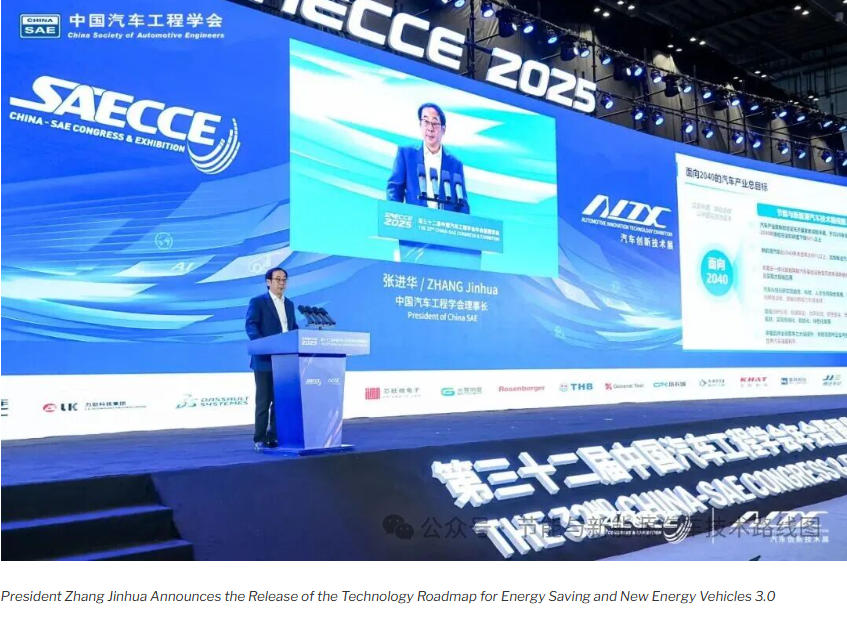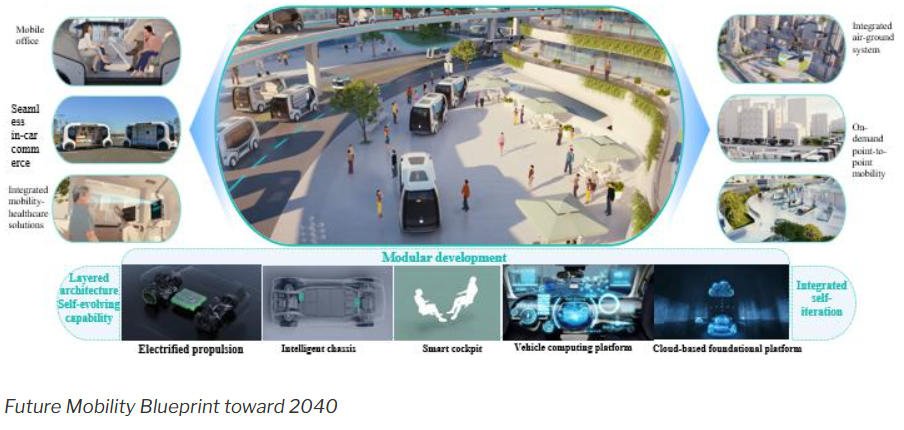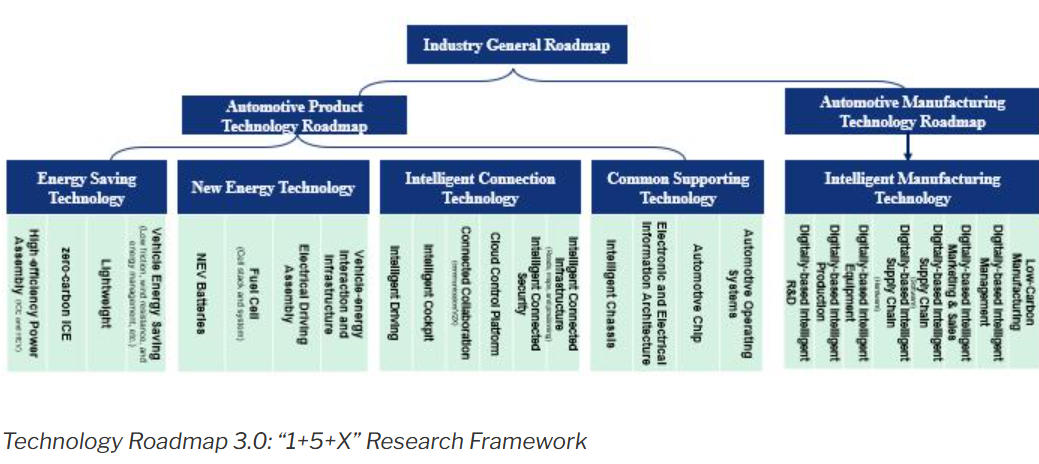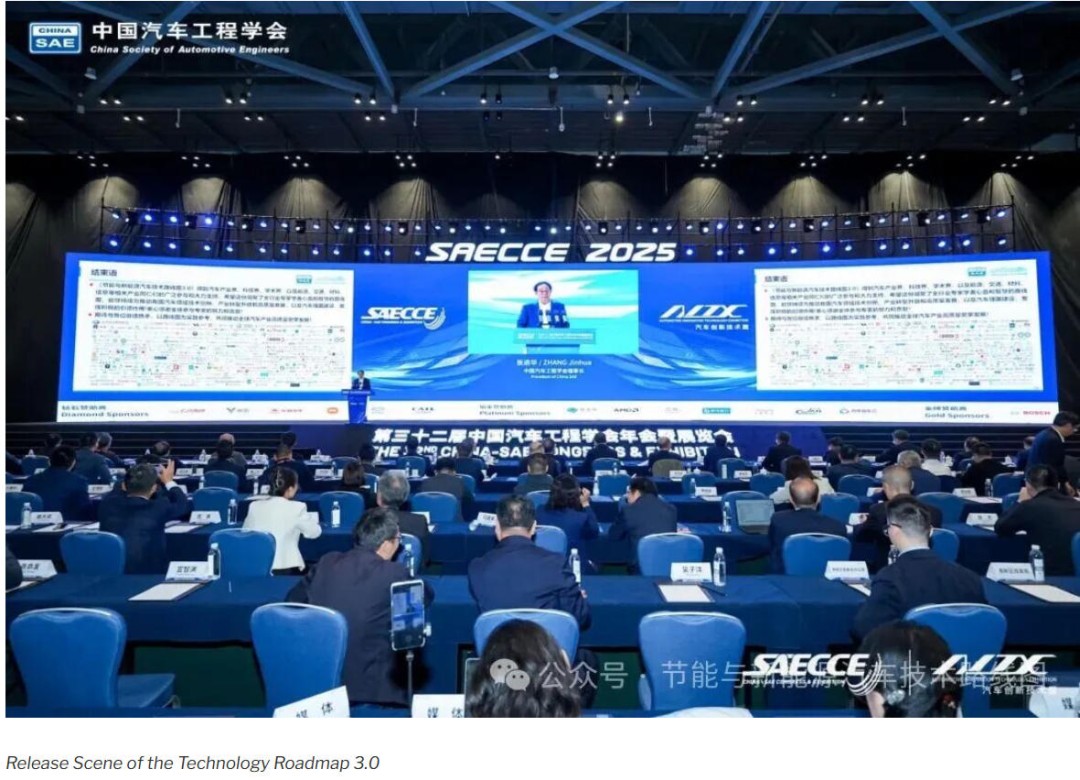The Technology Roadmap for Energy Saving and New Energy Vehicles 3.0 (“Technology Roadmap 3.0”) was officially released in Chongqing on October 22. It was revised and compiled over 1.5 years by more than 2,000 experts under the guidance of China’s Ministry of Industry and Information Technology (MIIT) and organized by the China Society of Automotive Engineers (China-SAE).
At the 32nd China-SAE Congress & Exhibition (SAECCE 2025), Zhang Jinhua, President of China-SAE, detailed the background and key content of the Technology Roadmap 3.0.

The Technology Roadmap 3.0 reaffirms the global automobile industry’s shift towards “decarbonization, electrification, and intelligence.” It analyzes the challenges and opportunities arising from post-pandemic economic recovery, climate action, technological revolutions, and economic globalization over the next 5-15 years. The document envisions a future automotive ecosystem driven by “new technologies, products, industries, ecosystems, and global dynamics” and outlines six key goals for China’s automobile sector by 2040: The industry’s total carbon emissions will peak ahead of China’s national carbon emission reduction pledge by 2028 and drop over 60% from the peak by 2040. Intelligent connected new energy vehicles (NEVs) will enable a transportation system with “zero accidents, zero fatalities, and high efficiency”. NEV adoption will exceed 80%, driving full electrification across the automobile industry. A mature vehicle-road-cloud integrated intelligent and connected vehicle (ICV) infrastructure ecosystem will enable large-scale application of high-level autonomous driving products. The automotive technological innovation will drive synergistic development across education, technology, and talent cultivation, positioning China as a global hub for original automotive innovation and a leader in pioneering R&D capabilities. A modern automotive industrial cluster will be established, characterized by innovation-driven strategies, data-powered efficiency, collaborative resilience, secure operations, and low-carbon sustainability, fostering high-end, intelligent, and green development. Chinese automotive brands are expected to significantly elevate their global competitiveness, with core component enterprises deeply integrated into the global industrial chain, propelling China to the forefront of the world’s automotive power hierarchy.

The Technology Roadmap 3.0 strengthens its revision principles of “forward-looking vision, systematic coordination, scientific rigor, evolutionary continuity, open collaboration, and public-benefit orientation.” Building on the foundational “1+X” research framework of the Technology Roadmap 2.0, it introduces a “1+5+X” framework tailored to the latest industrial transformations and emerging ecosystem dynamics. This framework structurally integrates technical roadmaps for “industrial product innovation” and “smart automotive manufacturing.”

The Technology Roadmap 3.0 reaffirms that internal combustion engines (ICEs) will remain a critical power source for vehicles. By 2035, all traditional energy passenger vehicles will achieve full hybridization; by 2040, ICE-based vehicles (HEV, PHEV, REEV) will still account for approximately one-third of new passenger vehicle sales.
The Technology Roadmap 3.0 highlights that NEVs will dominate the automotive market over the next 5–15 years. By 2040, NEV penetration in passenger vehicles will exceed 85%, with battery electric vehicles (BEVs) comprising 80% of this segment. NEV commercial vehicles will expand from urban/short-haul applications to medium- and long-haul scenarios.
The Technology Roadmap 3.0 emphasizes intelligent and connected vehicles (ICVs) entering a phase of rapid commercialization. By 2040, Level 4 (L4) ICVs will achieve widespread adoption, while Level 5 (L5) ICVs will begin market entry. Connectivity coverage, collaborative scenarios, and safety reliability will continuously improve, enabling secure large-scale self-driving applications.
The Technology Roadmap 3.0 introduces, for the first time, a hierarchical system and implementation methodology for smart automotive manufacturing. By 2040, guided by principles of quality enhancement, efficiency improvement, cost reduction, and low-carbon leadership, full integration of R&D, production, supply, sales, and services will be realized through data interoperability and closed-loop data systems.

Following its official launch, the Technology Roadmap 3.0 will be globally published in Chinese and English editions. The China-SAE will organize expert-led interpretations of the Technology Roadmap 3.0 and conduct annual evaluations and revisions of its goals and pathways, providing strategic insights to support policymakers, industries, academia, and researchers.
Introduction to the Technology Roadmap 3.0
The Technology Roadmap for Energy Saving and New Energy Vehicles serves as a critical tool for supporting government planning in technology and industry, steering technological innovation, and mobilizing social resources. Commissioned by the National Manufacturing Strategy Advisory Committee and the Ministry of Industry and Information Technology (MIIT), the China-SAE has led the research, development, and iterative updates of this roadmap. The first two editions (Technology Roadmap 1.0 and 2.0) were released in 2016 and 2020, respectively, alongside the establishment of an annual dynamic evaluation mechanism to track implementation progress. The automotive technology is now advancing rapidly, marked by cutting-edge innovations, disruptive breakthroughs, and systemic transformation of industrial ecosystems. In response to these emerging shifts and evolving trends, the revision of Technology Roadmap 3.0, designed to chart a 15-year pathway for automotive technology development and strengthen the governance framework for next-generation automotive ecosystems, has become a shared imperative across the global automobile sector. To meet this demand, China-SAE initiated the revision of the Technology Roadmap 3.0 in December 2023, mobilizing over 2,000 experts at home and abroad from automobile, energy, transportation, materials, communications, AI, and related fields. Over 18 months, rigorous research and systematic validation—including over 300 specialized workshops, expert panels, cross-team reviews, and editorial meetings—culminated in a consensus-driven Technology Roadmap 3.0 endorsed by industry stakeholders worldwide.
Contact Details of the Working Group for the Technology Roadmap 3.0
General Group Contact
Lin Yan
Phone: 13810890325
Email: linyan@sae-china.org
Chen Min
Phone: 13810027168
Email: chenmin@sae-china.org
Zhuang Ziruo
Phone: 18801375735
Email: zzr@sae-china.org
Media Contact
Company Name: China Society of Automotive Engineers
Contact Person: LIN Yan
Email: Send Email
Country: China
Website: https://en.sae-china.org/





